The human race has always depended on nature for fulfilling its needs. Most of the materials needed for our survival come from nature. It should be noted that after the industrial revolution, there has been a subsequent decline in the dependency on nature directly for fulfilling our needs.
The industries and factories that provide us with our daily use materials indirectly use the natural resources for their production.
Most of the modern industries, like pharmaceuticals, aerospace, and other related industries, are dependent on raw materials from chemicals extracted from natural resources. But sometimes, the separation process involved in the extraction of the desired constituents is very complex and should be carried out with care.
Fortunately, companies provide products like LeDab butane for extraction that can be used for the effortless extraction of components from base materials.
The most common type of extraction process employed is the closed loop extraction system. Sometimes open loop extraction is also used for some special component extraction.
In closed loop extraction, the solvent and substrate are both isolated from contact with the atmosphere. This has many advantages at the constitutional level.
In closed loop extraction, the whole chambers and connection tubes, and recovery manifold are all evacuated from the air and kept at the ideal pressure and temperature. This means that the solvent and substrate are both immune to air and atmospheric contamination. Since the recovery tube is also devoid of air, the solvents can be used again and again.
The advantages of having a closed loop vacuum-based extraction system are as follows:
- Low cost
- Maximum efficiency
- Optimum quality of products
- Easy to clean and low maintenance
- Safety
Low cost
The cost of extraction is considerably lower in closed loop extraction because the solvents can be reused. The hydrocarbons used in extraction like butane get contaminated on exposure to atmospheric air. But in closed loop extraction, the hydrocarbons do not come in contact with air, so they remain free of pollutants and impurities.
After filtering the solvents they are used again for the same extraction process.
Maximum efficiency
The solvent and substrate are kept at the optimum pressure and temperature, which compliments the extraction process. This means that the process is carried out faster and with more quality to the end product. This can be equated to improved efficiency compared to open extraction.
Safety
While most of the constituents involved in an extraction process are not inflammable, in contact with atmospheric air, there are chances for some chemical reactions to take place and possible fire. So closed loop extraction is safer than most of the other extraction methods.
In short, the association with reputed companies to acquire quality closed loop extraction systems can be beneficial in the long run.

